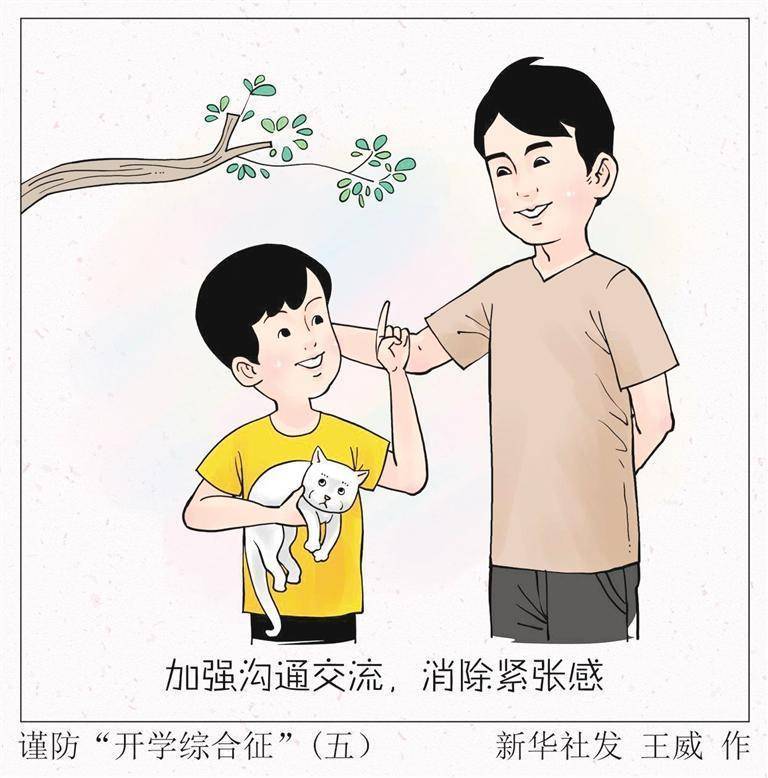Xinhua News Agency
As the new school year approaches, some children are just picking up their summer homework and writing in a hurry, anxious and exhausted, busy with “remediation”; some children stay up late playing games during the holidays, sleeping late and waking up late, unable to adapt to the routine after school starts; and some children may experience symptoms such as fever, diarrhea, poor appetite, and low spirits just before school starts. In response to this, Qi Jing, a psychotherapist at the Children’s Health Center of Xi’an Municipal People’s Hospital (Xi’an Fourth Hospital), said that “back-to-school syndrome” is not a medical diagnostic term, but refers to a series of physical and mental adjustment states that children show when transitioning from the “holiday mode” to the “back-to-school mode” at the end of the holiday.
Before and after the start of the school season, the outpatient volume of the Children’s Health Center of Xi’an Municipal People’s Hospital (Xi’an Fourth Hospital) increases by 10-20% than usual. Children who come for treatment may show physiological symptoms such as insomnia, drowsiness, dizziness, nausea, abdominal pain, diarrhea, etc. Psychologically, they may show signs of lack of focus, reduced memory, aversion to studying, anxiety, irritability, etc. “These manifestations are the subconscious psychological defense mechanisms of individuals, which convert some negative emotions that are not willing to be faced, recognized, suppressed, or unpleasant into physical symptoms, and may persist for some time,” said Qi Jing. For example, Hanhan, an 8-year-old child treated at the Children’s Health Center, expressed reluctance to go to school before the start of the school year, but parents did not pay much attention. After a week of school, Hanhan started to be distracted in class, either looking out the window or playing with stationery, showing no interest in anything, affecting emotions and entering a vicious cycle. After noticing this, parents took Hanhan to the hospital for assessment, revealing signs of lack of concentration and anxiety. The doctor provided a series of treatments, including psychotherapy and behavioral intervention. Three months later, parents reported that the child’s attention in class had improved, and anxiety had significantly improved.
How to solve “back-to-school syndrome”? Qi Jing provides the following suggestions:
1. Adjust daily routines and lead a regulated life. Set a fixed wake-up time, and for those who find it hard to get up in the morning, parents should make arrangements with the child the day before to have a purpose for action. Especially, avoid staying up late and refrain from using phones before sleep.
2. Reasonably reduce entertainment activities and gradually increase physical activity. For children who have been excessively engrossed in entertainment during the holidays, parents should pay attention to “cutting back.” Start by actively reducing the child’s entertainment time gradually, especially limiting the use of electronic devices, and replace them with handicrafts and educational games to help the child calm down, activate the brain, and focus. During the implementation process, it is essential to control the “degree,” especially when the child is playing video games to completion. Using commanding or coercive methods at this time might intensify emotional reactions, leading to conflicts. It is better to wait for the child to finish the game, then implement restrictions and have a talk. For children who have been less active, parents should gradually engage them in physical activities to prevent discomfort due to sudden increased physical activity after starting school.
3. Enhance the sense of back-to-school ritual. Discuss with the child about purchasing new study materials for the new semester, wrap textbooks together, prepare notebooks, error notebooks, buy reference books in advance, and let the child feel the atmosphere of back-to-school from the heart.
4. Collaborate on setting a study plan. Parents can plan the new semester with the child, establish a clear study plan, discuss family outings beyond studies, allowing the child to look forward to the future, which will help eliminate the sense of loss after the holiday.
Reporters Zhang Lina, Wang Chao


